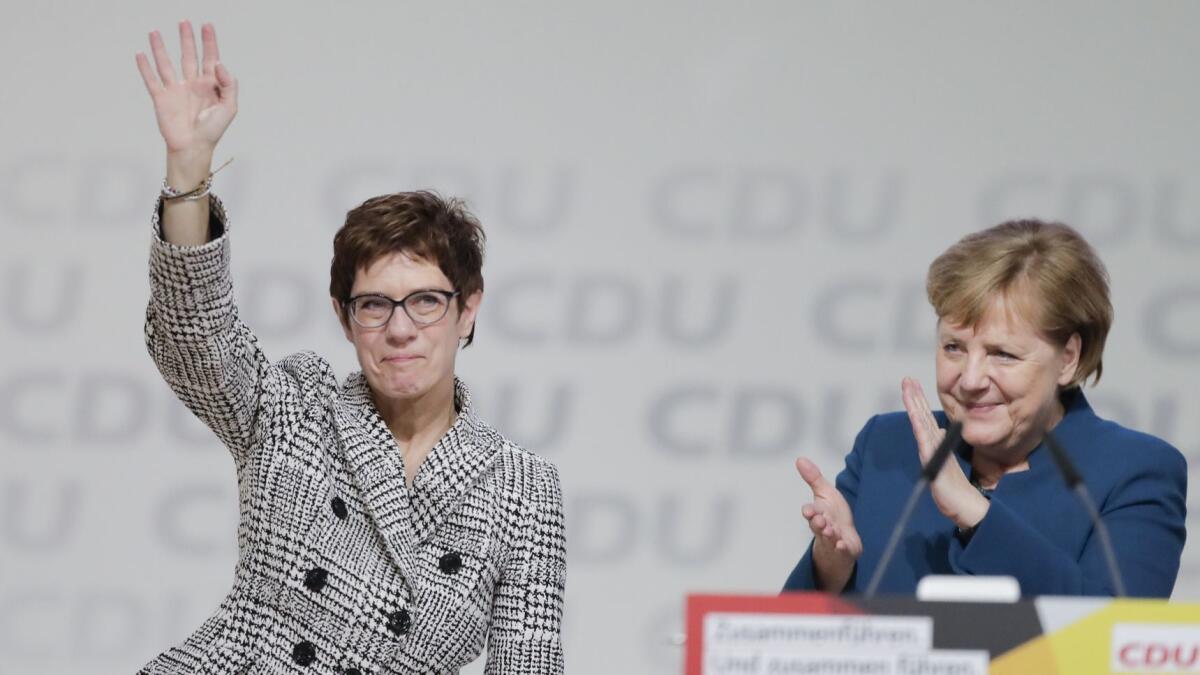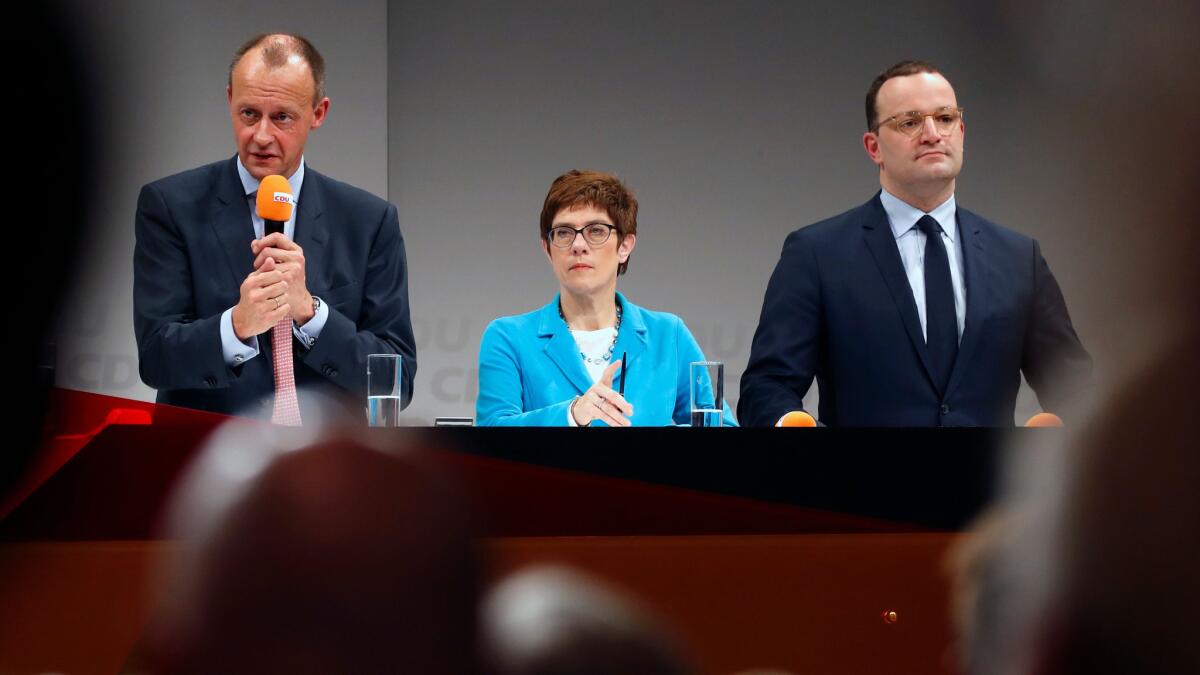There’s a reason that Germany’s ‘grumpy old men’ are grumpier than ever

It was never easy for the graying barons who had long controlled Germany’s conservative Christian Democratic Union party to be led by a woman — and after 18 years of Angela Merkel’s rule they were sure that she would be replaced by one of their own.
But the recent election of Annegret Kramp-Karrenbauer to lead the Christian Democratic Union, or CDU, caused such shock and consternation that scores of men have quit and hundreds more have threatened to leave the party — the dominant political force in Germany since World War II.
“There are many grumpy old men out there who wanted a man to lead them again and they were sure [Friedrich] Merz would win,” said Gero Neugebauer, a political scientist at Berlin’s Free University, referring to the defeated challenger. He added there were a lot of men deeply frustrated that another woman has been picked to lead them.
“They couldn’t imagine another woman would beat their guy,” Neugebauer said. “They’re shocked, bitter and disappointed now. They just don’t want a woman to lead them. They can’t get over it. There’s a lot of lingering resentment.”
In remarks tinged with sexism, some male leaders have warned darkly of a future coup against “AKK,” as she is better known because of the difficulties even Germans have pronouncing a name with eight tongue-twisting syllables. They have said she is not automatically the conservative candidate to follow Merkel as chancellor in 2021 — as would ordinarily be the case for the leader of the Christian Democrats.
Some have called for a break in tradition and suggested that Merz, the wealthy, 63-year-old businessman she narrowly defeated in a vote of 999 party delegates, could still end up becoming the country’s next chancellor. More ominously, some conspiracy theorists in the CDU accused party organizers of manipulating the microphone when Merz was speaking to the delegates to make him sound bad and training extra hot spotlights on him to cause him to perspire — all denied by party officials.
The CDU has 426,000 registered members nationwide. Two of the largest of Germany’s 16 states, Baden-Wuerttemberg and North Rhine-Westphalia, have each reported dozens of members quitting the party over Merz’s defeat. Other state organizations have reported smaller numbers of resignations.
Kramp-Karrenbauer, Merkel’s handpicked successor and the former governor of Saarland, has been in the headlines all week for her riposte against two powerful men casting aspersions on her leadership qualifications in a popular TV talk show. Host Anne Will had asked: “Does Kramp-Karrenbauer’s victory mean that this was the end of the predominance of old white men in this country?”
One of her guests, Wolfgang Kubicki, a leader of the centrist Free Democratic Party, directly addressed Kramp-Karrenbauer, who was also on the show, telling her that she had delivered “a rhetorically impressive speech” that was “full of emotion.”
Another man, retired business journalist Gabor Steingart, told Kramp-Karrenbauer that she had “hardly accomplished anything” as governor of Saarland, which he called “small” and “pathetic.” He questioned whether she was qualified to become chancellor, overlooking the fact that neither Merkel nor Merz ever ran a state government of any size.
Kramp-Karrenbauer called their remarks disrespectful and ignorant.
“The way you’re blathering on here is the kind of thing that I’ve had to deal with my whole life,” she began, adding she had heard this “misogynist garbage” too often before. “Many of the men I’ve worked with in politics are never asked ‘And how do you manage with three children?’ It’s like women are some kind of pitiable species. Women, let’s not forget, make up more than half of the population.”
The grousing over her ascension has not subsided — and viewership ratings have been high all week for shows that are eagerly trying to dissect and tap into the dissent. In another popular talk show Wednesday, an archconservative publisher, Helmut Markwort, belittled Kramp-Karrenbauer’s experience and even called her a leftist.
“Sorry to say this, but the woman never worked in a company in her life, she has no business experience whatsoever,” said Markwort, who is 82. “She’s only been a politician.”
Neugebauer, the political scientist, said there were a lot of men deeply frustrated that another woman had been picked to lead them. Considering the longevity and stability in German politics, with two of the last three conservative party leaders holding office for 43 of the last 44 years, it could mean many will never see a male leader again in their lifetimes. Kramp-Karrenbauer is 56.

The glass ceiling is thick in Germany. There are no women leading any of Germany’s 30 largest publicly traded companies and women hold just 8% of those executive boards’ seats. The pay gap between men and women is wider in Germany than in most European countries, with women earning an average of 21% less than men, according to a recent survey in Der Spiegel magazine.
Merkel is a Protestant pastor’s daughter from formerly communist eastern Germany in a party dominated by Roman Catholic men from western Germany. Reflecting her improbable rise to the top, she was first considered to be just an interim party leader when elected in 2000 — seen more as an accident of history at a time when the conservatives were stuck in opposition and bogged down by an ugly campaign financing scandal.
Her squeaky clean, youthful image and unflappable style helped repair some of the damage caused by the elderly male leaders. But she surprised many by holding on to the job, outfoxing Merz and a dozen other male rivals in subsequent years before leading the party back to power as chancellor in 2005.
With the inner-party debate on Kramp-Karrenbauer threatening to boil over in her first week as chairwoman — normally a honeymoon period filled with good wishes and goodwill — one of the strongest and most powerful backers of Merz urged the losers to settle down and accept their defeat.
Wolfgang Schaeuble, the 76-year-old president of Parliament and longtime former finance minister, told Bild newspaper: “Those who are pining for a rematch or even vengeance have it all wrong. That’s not the way democracy works.”
Kirschbaum is a special correspondent.
More to Read
Start your day right
Sign up for Essential California for news, features and recommendations from the L.A. Times and beyond in your inbox six days a week.
You may occasionally receive promotional content from the Los Angeles Times.






